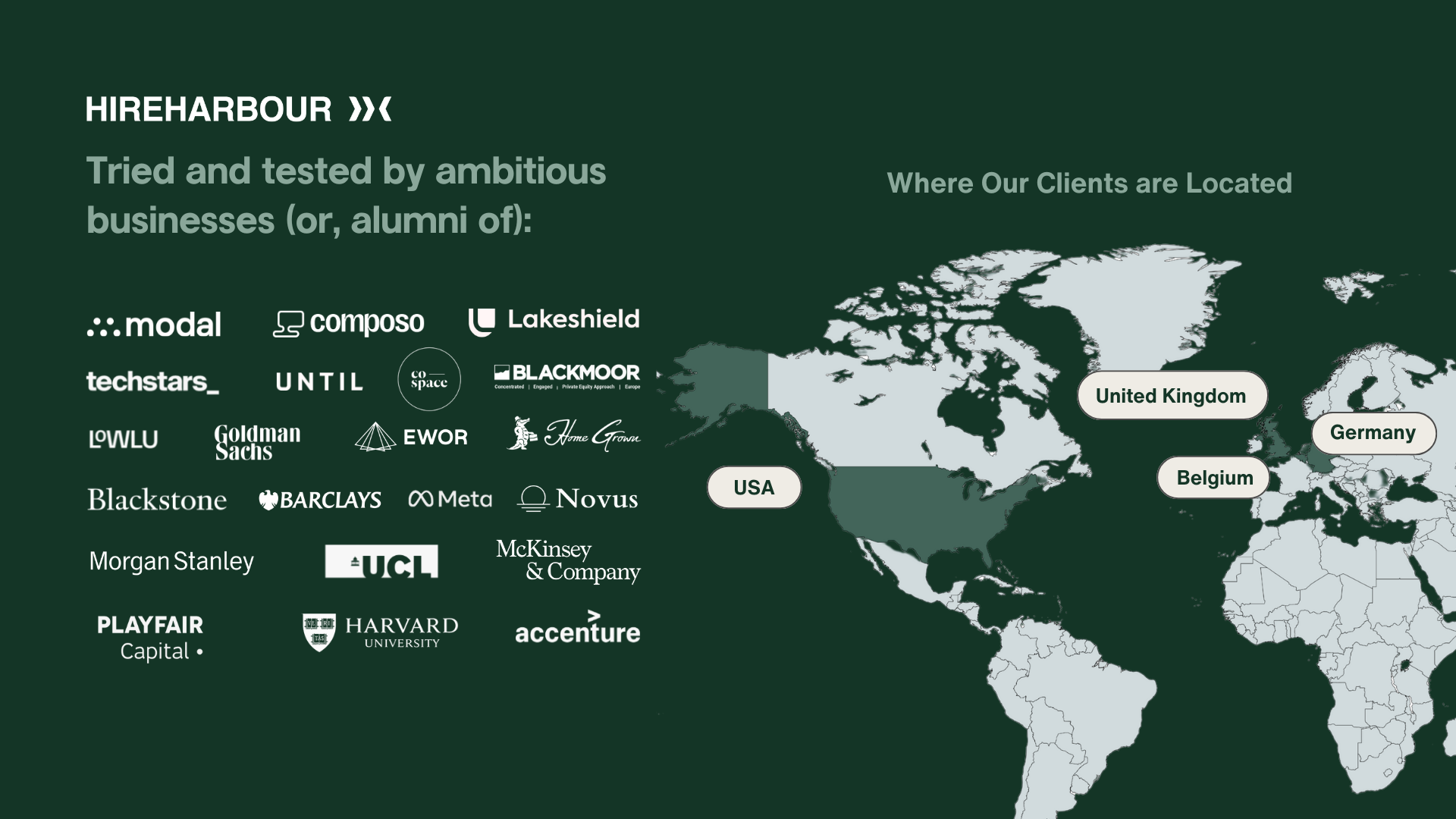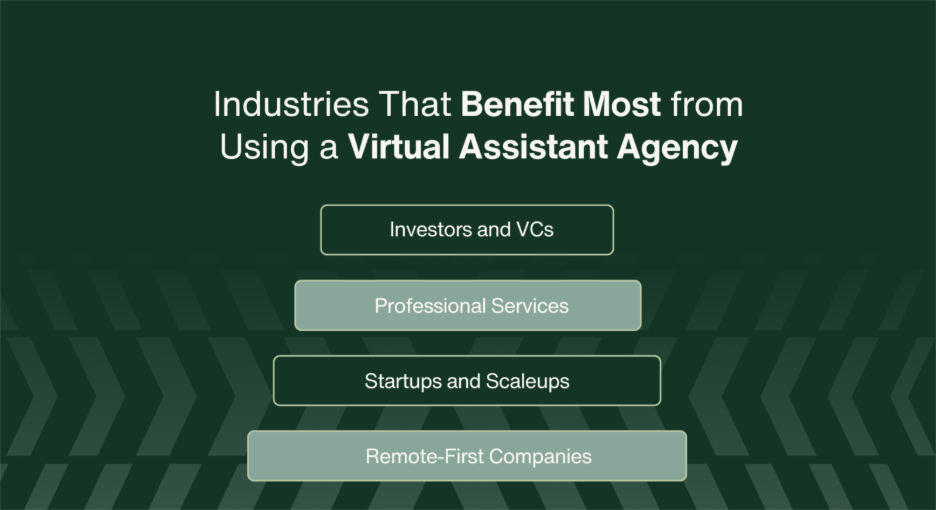Virtual Assistant Agency vs In-House Hire for Businesses: What PE Firm CEOs Need to Know
At a glance

Virtual assistant agency vs in-house hire is a decision every CEO eventually faces when thinking about scaling executive support. The choice has big implications for time, costs, and overall business agility. For leaders navigating rapid growth, investor demands, and operational complexity, selecting the right model can mean the difference between staying ahead or falling behind.
A virtual assistant agency provides flexibility, access to global talent, and services designed to ease the pressure on busy executives. In-house assistants, however, offer day-to-day proximity and deeper integration into company culture, though often at a higher financial and management cost. CEOs must carefully consider which path will deliver the most leverage for their unique context.
This article breaks down the trade-offs between agency support and in-house hiring. We’ll cover pros and cons, costs, scalability, industry-specific benefits, decision frameworks, and the risks that can be avoided by working with a trusted provider.
What Are the Pros and Cons of Hiring Through a Virtual Assistant Agency vs In-House Staff?
When considering virtual assistant agency vs in-house hire, CEOs need to weigh both the advantages and limitations of each option. An agency can provide flexibility, global talent, and ready-to-go support, while in-house staff may deliver closer cultural alignment and long-term continuity. The right choice depends on how a business balances cost, control, and scalability.
Pros of a Virtual Assistant Agency
- Access to pre-vetted talent. Agencies source and screen assistants, saving CEOs from lengthy recruitment processes.
- Flexibility in hours and services. Businesses can scale support up or down depending on demand.
- Reduced risk. If one assistant is unavailable, agencies can provide coverage.
Cons of a Virtual Assistant Agency
- Less direct oversight. Agency EAs work remotely, which can feel less integrated.
- Dependence on the provider. Service quality depends on the agency’s infrastructure and training.
Pros of In-House Staff
- Cultural alignment. On-site assistants absorb company culture quickly.
- Physical presence. Having someone nearby can simplify communication and coordination.
- Long-term continuity. A permanent assistant can grow with the CEO’s needs over time.
Cons of In-House Staff
- Higher financial costs. Salaries, benefits, and office space quickly add up.
- Recruitment and turnover risk. Hiring takes time, and losing an assistant can set progress back.
- Limited scalability. One person can only take on so much, making it harder to scale support as the business grows.
Understanding these trade-offs is the first step in making an informed decision. Once the pros and cons are clear, the next logical question is cost. How do agency fees compare to the significant investment of hiring a full-time executive assistant in-house?

How Much Does a Virtual Assistant Agency Cost Compared to Hiring Full-Time?
A virtual assistant agency typically charges hourly rates or monthly retainers. Depending on the level of support, costs can range from about $500 to $4,000 per month for part-time to full-time equivalent service. This model allows businesses to pay only for the hours or responsibilities they need, without the overhead of full employment.
By contrast, hiring in-house comes with a very different price tag. In the U.S., experienced executive assistants often earn between $60,000 and $100,000 annually, plus additional costs for benefits, payroll taxes, equipment, and office space.
According to Indeed, the average base salary for an Executive Assistant in the U.S. is approximately $68,395 per year. Salary ranges in some markets can reach into the $85,000+ range, as noted by Glassdoor.
The math is simple: agency support provides more predictable, flexible costs, while an in-house hire represents a fixed and significant long-term financial commitment.
Can a Virtual Assistant Agency Scale with Your Business Better Than an In-House Assistant?
Virtual assistant agencies are designed to scale. Whether a CEO needs 10 hours of help a week or multiple full-time equivalents, agencies can adjust resources quickly. This flexibility is ideal for businesses navigating unpredictable workloads or rapid growth.
By contrast, a single in-house assistant has limited capacity. Adding more support requires another full-time hire, which involves recruiting, training, and onboarding from scratch. For CEOs who value agility, the agency model often provides a better fit.

What Industries Benefit Most from Using a Virtual Assistant Agency?
While nearly every sector can benefit from executive support, certain industries are especially well-suited to agency models:
- Startups and Scaleups: Founders can access high-level support without straining limited budgets.
- Professional Services: Consultants, lawyers, and finance professionals rely on EAs to handle client communication, scheduling, and research.
- Investors and VCs: Deal flow, pipeline management, and memo preparation are tasks easily supported by agency EAs.
- Remote-First Companies: With distributed teams, having assistants already skilled at remote workflows is a major advantage.
These examples highlight how adaptable agency-based assistants can be across different business models.
But industry fit is only part of the decision. For CEOs, the real challenge lies in choosing between a virtual assistant agency and a permanent employee. Understanding how leaders make that decision is the next step.
Why Private Equity Firms Often Prefer Virtual Assistant Agencies Over In-House Hires
For private equity firms, the decision between a virtual assistant agency and an in-house hire carries additional weight. Partners and senior investment professionals operate across multiple portfolio companies, deal teams, and stakeholder groups simultaneously. Their support needs are not static; they fluctuate with deal cycles, fundraising periods, and board activity.
In this environment, flexibility and reliability matter more than physical proximity. A virtual assistant agency allows private equity professionals to scale support during intense periods such as live deals, exits, or portfolio transformations, without committing to permanent headcount. This is especially valuable when workloads spike unpredictably or when support needs vary across funds and geographies.
Agencies also reduce key-person risk. In-house assistants can become single points of failure, particularly when deeply embedded in complex workflows. Agency models mitigate this by providing coverage, continuity, and documented processes, ensuring that critical execution does not stall due to absence or turnover.
For private equity leaders, confidentiality and judgment are equally critical. Reputable virtual assistant agencies train assistants to operate with discretion, handle sensitive financial and investor information, and support senior professionals without constant oversight. The result is leverage without fragility — a support model that adapts as quickly as the firm itself.
How Do CEOs Decide Between a Virtual Assistant Agency and a Permanent Employee?
The choice often comes down to stage, budget, and long-term needs. Early-stage businesses or lean teams benefit from agency flexibility, paying only for what they use. Growth-stage or enterprise businesses may find an in-house assistant worthwhile when workloads become predictable and constant.
Key questions for CEOs to consider include:
- What is my current budget for support?
- Do I need flexibility in hours and capacity, or do I want a permanent fixture on my team?
- How important is cultural integration versus immediate efficiency?
- Am I prepared to handle recruitment, training, and payroll overhead?
By answering these questions honestly, CEOs can align their choice with their business priorities.
For leaders who value both flexibility and top-tier talent, virtual assistant agencies that specialize in executive support stand out. The best agencies not only provide vetted assistants but also embed technology and training into their model, giving CEOs more leverage from day one. This is where HireHarbour’s approach becomes especially relevant.
What Risks Are Avoided by Choosing a Virtual Assistant Agency Like HireHarbour?
Working with a virtual assistant agency reduces several common risks that come with hiring in-house.
- Turnover and hiring risk: Agencies provide replacements quickly, avoiding downtime.
- Compliance and payroll complexity: CEOs don’t need to navigate HR, taxes, or benefits.
- Training burden: Agencies deliver assistants who are already experienced and AI-savvy, allowing executives to benefit from cutting-edge productivity tools without additional effort.
HireHarbour in particular specializes in placing AI-native executive assistants who combine traditional EA skills with fluency in automation and modern tools. That means CEOs can delegate more, scale faster, and unlock leverage without taking on the risks of recruitment and long-term overhead.
Conclusion
Choosing the Right Support Model for High-Intensity Leadership
The decision between a virtual assistant agency and an in-house hire is ultimately about leverage, not headcount. In-house assistants offer continuity and cultural immersion, but they come with fixed costs, operational overhead, and limited scalability. Virtual assistant agencies, on the other hand, provide flexibility, risk reduction, and the ability to adapt support as business demands evolve.
For CEOs, investors, and private equity professionals operating in fast-moving, high-stakes environments, the agency model often aligns better with reality. It enables leaders to scale support up or down, avoid recruitment and turnover risk, and access assistants who are already trained in modern tools, remote workflows, and executive-level execution.
Agencies like HireHarbour are designed for this exact use case: delivering AI-native, high-judgment executive support without the constraints of traditional hiring. For leaders who value speed, discretion, and optionality, choosing a virtual assistant agency is less about outsourcing and more about building durable leverage.
For quick productivity hacks, the latest trends in virtual executive assistance, and insights to help you get more done, follow HireHarbour on LinkedIn. It’s time to make a difference!
Ready to make every second count?



.svg)

.png)

